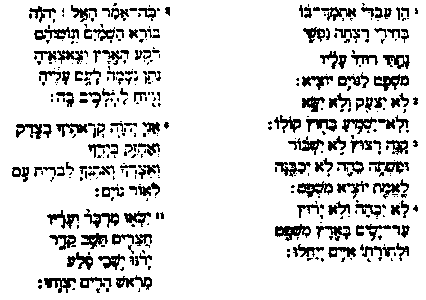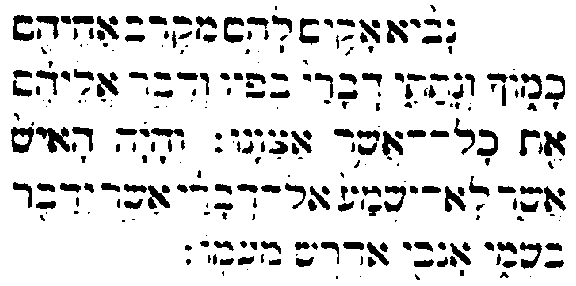
It is easy for God to speak with distinction of things thousands of years prior to their occurrence, but impossible for man to do so. According to the Old Testament, the faithfulness of Abraham was given special reward by a covenant or promise to bless all mankind through his descendants. His line would be distinguished by divine guidance and prophecy.
"By Myself have I sworn, saith the Lord, because thou hast done this thing, and hast not withheld thy son, thine only son, that in blessing I will bless thee, and in multiplying I will multiply thy seed as the stars of the heaven, and as the sand which is upon the seashore... and in thy seed shall all the nations of the earth be blessed, because thou hast hearkened to my voice" [5].
The Bible is the record, primarily, of God's favor to Abraham's second son Isaac, in whose line came Moses and Jesus (peace be upon them). But what about the first-born of Abraham, Ishmael?
The Genesis story about the turning out of Ishmael and his mother, Hagar, the Egyptian servant woman of Sarah, due to Sarah's jealousy in being unable to bear the first son of Abraham, is an early example of Hebrew chauvinism, full of contradictory elements [6]. In effect, Genesis closes the door on Hagar and Ishmael; from henceforth only Isaac and Sarah matter. But God's promise to Abraham was not biased. When He made the "everlasting covenant" with the family of Abraham, Isaac was not even in the picture (Please also see 'Added Comments' at Reference [5] at the bottom of this page). Ishmael was his only son and God declared: "As for Ishmael, I have heard thee; behold I have blessed him ... ... twelve princes shall he beget, and I will make him a great nation" [7].
The writers of Genesis wrongly attempted to make it appear that Ishmael would receive an inferior blessing because his mother was a servant woman, but Isaac, being the son of the free woman, would inherit the glory of the first-born son. In so doing, they disgraced the clear family laws of the Torah. According to this law, the rights of the first born son are not invalid due to the social status of his mother. This applied especially in polygamous marriages such as that of Abraham [8]. Man's social prejudices do not in any way dictate the favor of God. According to the Torah

"If a man has two wives, one loved and the other unloved (i.e. slighted or socially despised due to inferior social status), and both the loved and the unloved have borne him sons, but the first -born is the son of the unloved wife, when he wills his property to his sons, he may not treat as first-born the son of the loved one in disregard of the son of the unloved one who is older. Instead, he must accept the first-born, the son of the unloved one, and allot him a double portion of all he possesses; since he is the first fruit of his vigor, the birthright is his due" [9].
But the Bible disregards this fair principle and gives throughout the ''double portion " of honor to Isaac, the second son and makes it actually appear that the "birthright" is his (Cf. Genesis 17:21: "but My covenant will I establish with Isaac, whom Sarah shall bear ..."). This makes the "Torah" of the Bible a contradictory law. By right, the double honor and the birth right belong to the line of Ishmael, and the "unloved" social status of his mother detracts from this not at all.
Ishmael's descendants came to be known as Arabs, a term which, in Hebrew, meant those who inhabited the 'arabah' or desert [10]. It is not a coincidence that of the twelve sons of ishmael (Genesis 25:12-16) the one mentioned most prominently is Qaydar (Qedar in Hebrew). In some Bible verses, Qaydar is synonymous with the Arabs in general [11]. This is an important indication that the line of Qaydar was marked by God for a unique purpose, to bring forth the one whose life and work would bring "a double portion" of honor to the house of Ishmael.
The nature of this twofold honor begins to be revealed in the Old Testament book of Isaiah. There are many brilliant parables and prophecies in Isaiah which concern the fulfillment of God's promise to bless all mankind through the family of Abraham. Christians believe that some of these accounts relate to the gentle but forthright mission of Jesus as the Messiah. But the 42nd chapter of Isaiah is distinct because it points, not to the Hebrew, but to the Arab branch of Abraham's family. Here Isaiah points out a chosen "Servant of the Lord" who would have a prophethood to all mankind, unlike the Hebrew prophets whose mission was limited to Israel. God's spirit would guide him and he would establish justice on earth. He would not rule as a loud or boisterous demagogue. Unlike the brief ministry of Jesus, this prophet would serve long enough to "set right in the earth", to actually establish a society or community based on truth and justice. He would be "a light of the nations". What is most startling about this particular servant of the Lord is that he, alone, is identified with Qaydar in verse 11.

"Here is My servant, whom I uphold, My chosen one whom I delight, I have bestowed My spirit upon him, and he will make justice shine on the nations. He will not call out or lift his voice high, or make himself heard in the open market. He will not break a bruised reed, or snuff out a smouldering wick; he will make justice shine on every race, never faltering, never breaking down, he will plant justice on earth, while coasts and islands wait for his teaching. Thus speaks the Lord Who is God, He Who created the skies and stretched them out, Who fashioned the earth and all that grows in it, Who gave breath to its people, the breath of life to all who walk upon it: I, the Lord, have called you with righteous purpose and taken you by the hand; I have formed you and appointed you to be a light to all peoples, a beacon for the nations... ... Let the wilderness and its towns rejoice, and the villages of the tribe of Kedar (Qaydar)" [12].
This prophecy could apply to none of the Hebrew prophets. Even Jesus made it plain that his mission was far from being universal, saying: "I am not sent but unto the lost sheep of the house of Israel" (13). His calling was limited and it was the later Gentile converts, not Jesus, who gave Christianity its inclusive nature. Nor was Jesus or any of the Hebrew prophets related in any way to "Kedar" (Qaydar). In promising a great prophet from the Arabs, Isaiah was merely amplifying the prophecy made previously by Moses. God revealed to Moses that a prophet would arise from the brothers of the Hebrews- the Arabs, who were children of the brother of Isaac, Ishmael- who would command world-wide attention and obedience.

"I will raise them up a Prophet from among their brethren, like unto thee, and will put my words in his mouth, and he shall speak unto them all that I shall command him. And it shall come to pass, that whosoever will not hearken unto My words which he shall speak in my name, I will require it of him" [14].
This prophet would have to be "like unto thee (Moses)", who was founder, leader and exemplar of a community of believers, one whose mission would last long to achieve cohesive, concrete results.
When one compares the teachings and life stories of Moses (pbuh) with those of Muhammad (pbuh), one is convinced that the prophecy refers to Muhammad and Muhammad alone!
[5] Genesis 22:16-18, Jewish Publication Society's version, 1955.
Added Comments: Note that the son of sacrifice (Dhabihullah) is stated to be the only son of Abraham. Recent Jewish translations change this to read the "favored son" of Abraham. However, the Hebrew text says yehideka, which is a noun form of yahid. Yahid in Hebrew corresponds with wahid in Arabic and has the same meaning, "sole, single, only, only one" (Shilo Hebrew Dictionary, p. 83). The reference thus must be to Ishmael, not Isaac, since Isaac was never the sole or only son of Abraham. However, some Jewish commentators, while admitting that yehideka means "only son", twist the meaning to make it refer to Isaac by saying that Ishmael was ileegitimate, so Isaac was the only real son of Abraham. But the Torah of the Bible nowhere says that Ishmael was illegitimate. Rather, it says, "And Sarah Abrham's wife took Hagar her maid, the Egyptian, and gave her to her husband Abraham to be his wife" (Genesis 16:3). Since Hagar became the second WIFE of Abraham, Ishmael could not have been "illegitimate". A man does not bear illegitimate children from his wife. Further, God says of Ishmael, "I have blessed him ... .... .... .... and will make him a gret nation" (Genesis 17:20). In Genesis 17:23, 25 and 26, we read: "And Abraham took Ishmael HIS SON ... ... and Ishmael HIS SON was thirteen years old, when he was circumcised. In the selfsame day was Abraham circumcised, and Ishmael HIS SON". At the very last, when Abraham had passed away, the Bible says: And his sons Isaac AND ISHMAEL buried him in the cave of Machpelah" (Genesis 25:9). The Bible is explicit that Ishmael was fully the son of Abraham and by no means illegitimate!
[6] E. A. Speiser, Genesis (New
York, 1964). The Anchor Bible, Vol. I, pp.156, 157.
[7] Genesis 17 4-10, 20.
[8] Hastings, op. cat., p. 626.
[9] Deuteronomy 21:15-17, from The
Torah, Jewish Publications Society, 1962.
[10] Hastings, op. cat., p.
47.
[11] See Jeremiah 2:10, Ezekiel 27:21,
Isaiah 60:7; Song of Solomon 1:5.
[12] Isaiah 42:1-6, 11 New English
Bible.
[13] Matthew 15:24.
[14] Deuteronomy 18:18, 19.